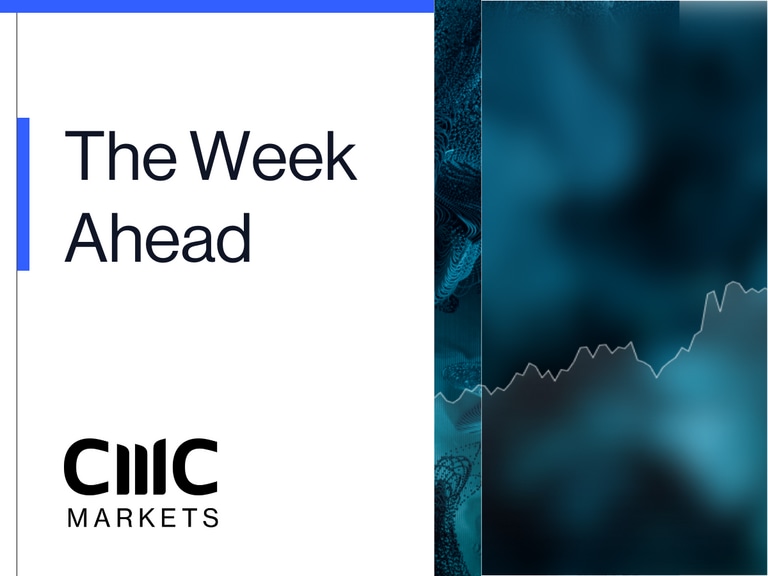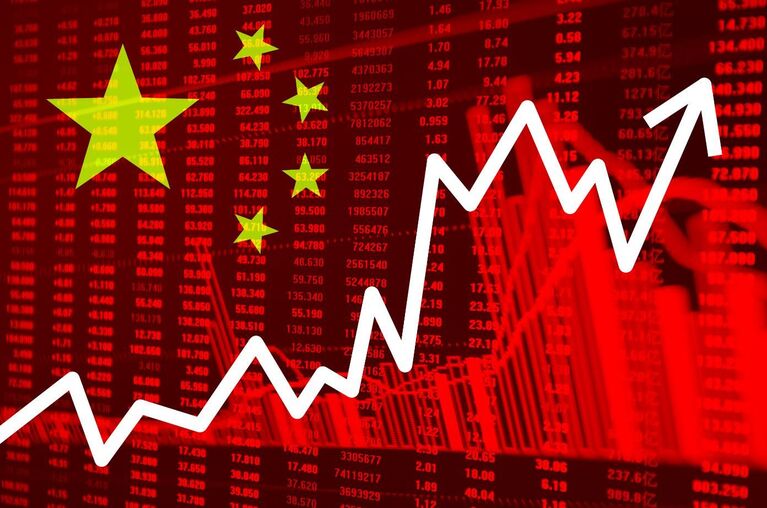
Watch our week ahead video preview, read our pick of the top stories to look out for this week (13-17 July), and view our key company earnings schedule.
In this week's video, UK chief market analyst, Michael Hewson, looks at the divergences between the Nasdaq and other US markets, and ahead to a big week for earnings and macro data. This includes the ECB rate meeting, EU leaders pandemic summit, China Q2 GDP, UK unemployment, US bank earnings, plus Netflix and Ocado results. He also looks at the key chart levels on all the major indices, currencies and commodities, including the Nasdaq, S&P 500, FTSE 100, gold, sterling and the euro.
China trade balance (June)
Tuesday: Recent data from June appears to suggest that the Chinese economy may be starting to gain traction after a slow rebound from its February lockdown. Over the past three months we’ve seen modest improvements, albeit from a very low base. With both the US and European economies slowly reopening in May and June, there is an expectation that trade flows will improve as well. So far progress has been a little slow in this regard, with disappointing numbers in May. Over the last three months imports have shown big year-on-year falls as the economy recovers from the hefty blow, not only to economic activity but also consumer confidence. Imports are expected to show a decline of -8.7%, an improvement on the -16.7% decline in May. Exports should do better now that economic activity has continued to improve globally, however even here the improvement is likely to be modest. Exports have been one area that has held up fairly well, largely as a result of the export of PPE and other virus-related products, with a decline of -1.3% expected.
UK GDP (May)
Tuesday: The UK economy contracted by -20.4% in April. This wasn’t a surprise given that most people were at home and the main arterial roads into UK cities resembled the backdrop of a tumbleweed-strewn spaghetti western, with reports in some quarters of animals in some rural towns due to the lack of traffic. That is probably as bad as it can get, and the number in May is likely to be much better as lockdown restrictions slowly get eased.
Ocado half-year results
Tuesday Ocado has had a number of problems over the years, but its share price has proved to be resilient despite the business not yet having posted a profit. Ocado’s strength lies in its unique technology, which has received a significant boost as a result of the coronavirus pandemic. Fires at distribution warehouses put constraints on capacity, as well as costing the company more than £100m. However, the deal with Marks & Spencer is likely to see revenues increase: at the end of February the company said it expected to grow retail revenue for the upcoming year by 10% to 15%. Since then, Ocado has had to close down its website in order to deal with increased demand from online traffic, while in June the company raised another £1bn in the form of a share and convertible bond placing, to make speedier infrastructure upgrades. This will see Ocado increase capacity, not just in the UK, but also at its partners in the US, France and Canada.
US banks Q2 results
Monday, Tuesday & Wednesday: It’s set to be another big week for US banks as they report their latest Q2 numbers in the wake of the shutdown of the US economy back in April. The recent Federal Reserve stress tests conducted three different scenarios; a V-shaped recession, a W-shaped one and a longer U-shaped recession and recovery. Under the most arduous scenario, Goldman Sachs came the closest to the 5% cut off, while Bank of New York Mellon performed the best. In response to the tests, the Fed capped the dividend that could be paid, while also suspending any plans to buy back shares. At the last set of quarterly numbers, it was notable that collectively the US banks set aside almost $25bn in terms of provision for non-performing loans. It will be interesting to note whether any US banks decide to set aside additional funds after the events of the last three months.
Burberry Q1 results
Wednesday: Luxury fashion retailer, Burberry, has had to contend with a number of challenges over the last 12 months, from the disruption of its Hong Kong business, to the fallout from weaker Chinese demand and the spread of coronavirus In May, the company’s full-year numbers showed operating profit slid 57% to £189m. Total revenue came in at £2.63bn, with the costs of the disruptions in Hong Kong, as well as the closure of various stores due to coronavirus, pushing impairments up to £245m. With the recovery likely to remain weak, stores across the business have slowly started to reopen. Management said in May they expected Q1 to be severely disrupted, with 50% of its store network closed, though since then we’ve seen further reopenings start to take place. There are silver linings: sales in mainland China and Korea were looking good, so the hope is that this will have continued in the last few weeks, while Europe, the UK and US economies continue their respective paths towards reopening.
Dunelm Q4 results
Wednesday: Dunelm has been one of the few success stories in UK retail in recent years, and last year the company reported strong operating profits and paid a special dividend. A repeat is unlikely to happen this year. The company closed all of its stores on 24 March, furloughing employees under the UK government’s job retention scheme. In April, the company reopened its online business and drew down its existing financing facilities of £175m. At the time, it said it had enough capital to withstand store closures for up to six months. Fortunately, that hasn’t come to pass, and all of its stores have now reopened, with one-way systems, strict social distancing guidelines in place and in-store coffee shops still closed. The Dunelm share price has managed to recover all of its losses for this year, though it’s still below the highs from February.
UK ILO unemployment & weekly jobless claims
Wednesday: There is a significant discrepancy between the ILO measure of UK unemployment, which is currently understating the potential shock to the UK labour market at 3.9%, and the monthly jobless claims numbers, which are slightly more current. The claims numbers have risen by 1.5m people over last two months and there could be another 0.5m added in June as well. There is no doubt that the government’s furlough scheme is cushioning the pace at which these job losses are likely to come through in the coming months, but as we’ve seen and heard in the last few weeks, these numbers look set to rise further as we head into year end. In May, the claimant count rose to 7.8% and a 20-year high, a rise of 1.5% from April, and it looks set to rise further to levels close to 9%.
China GDP (Q2)
Thursday: The Chinese economy contracted -9.8% in Q1 this year, pushing the annualised growth number sharply into negative territory of -6.8%. Since then retail sales data hasn’t been close to moving back into positive territory, while import data has shown that internal demand remains weak. Exports only really improved as a result of PPE and other medical exports, yet forecasts for Q2 expect to see a V-Shaped rebound in Q2 of 9.6%. This seems barely credible at a time when retail sales have been negative in April and May and are also expected to decline in June. Industrial production has been a little better, but it’s still well below the long-term average.
China industrial production & retail sales (June)
Thursday: It’s been a slow grind back for the Chinese consumer after the lockdown in February. Since then retail sales have declined -20.6%, -15.8%, -7.5%, and -2.8%, and while we’re going in the right direction, the clear takeaway remains one of weak demand and a cautious consumer. This month we could see a move into positive territory year on year, which when you consider China retail sales were trending at 8% is a harsh adjustment. With summer now getting into full swing in the northern hemisphere, there may be a positive surprise. Industrial production has been doing better, with expectations of a 4.8% rise following the 4.4% gain in May.
European Central Bank rate meeting
Thursday: This week’s ECB rate meeting isn’t expected to yield too much in the way of surprises. At its last meeting, the central bank hiked its pandemic emergency purchase programme by another €600bn to €1.35trn, with the time horizon pushed into the middle of June 2021. It also downgraded its growth and inflation forecasts, while it appearing unconstrained by the recent German constitutional court challenge to the legitimacy of its old bond buying programme. The ECB still needs to formally respond to the challenge of the German court, irrespective of its insistence it’s covered under the jurisdiction of the European Court. Even where Germany is concerned optics are important, particularly if the ECB wants to be seen as a responsible arbiter of the economy across Europe. The bank could also indicate if it has any plans to start buying the bonds of so called “fallen angels” – companies that were investment grade, but have fallen into “junk” status as a result of the pandemic.
Netflix Q2 results
Thursday: There were lofty expectations when Netflix reported its Q1 numbers back in April, due to the very high bar management set in January with a target of 7m new subscribers. After a brief sell-off at the end of February and beginning of March, shares have gone from strength-to-strength, rising from a low of $290 to record high levels of $500. The Q1 numbers didn’t disappoint, with new subscribers surging to 182.8m, a gain of 15.8m. Some of this may be a result of a pull forward from Q2, but they are still nonetheless pretty good. Revenue also improved, coming in at $5.77bn, as the company posted its best-ever numbers. Slightly more concerning is that profit fell slightly short of expectations, which suggests that costs went up significantly in the past three months. However, the strength of the US dollar may have played a part in that. Netflix’s biggest problem now is how many of these subscribers stick around once the lockdown is lifted. There are also concerns about their content pipeline, which is suspended due to lockdown restrictions. This shouldn’t be a problem in the short term, as a lot of newly released shows were put into the can a while ago, and this issue isn’t unique to them. Expectations for Q2 are for 7m new subscribers, taking the global total to 190m, with these numbers expected to act as a bellwether for the wider streaming market. Profit is expected to come in at $1.814 a share.
EU Summit – pandemic recovery fund
Friday: The stakes for Europe couldn’t be higher as we look towards this week’s EU Summit, as Germany takes the reins of the six-month rotating EU presidency. Earlier this month, German chancellor, Angela Merkel, urged EU leaders to come together in a crisis that could determine Europe’s future, and agree a package immediately, saying that the EU was in the most difficult situation in its history. Her tone suggested that she hopes by raising the prospect of an EU breakup, she can railroad any agreement through. This seems unlikely even without the populist mood already rippling across Europe. In May, EU Commission president, Ursula von der Leyen, proposed a €750bn recovery fund, financed by up to €500bn of grants and €250bn of loans. The proposal has generated a significant amount of pushback from the likes of the Netherlands, Austria, Sweden and Denmark, unhappy at the lack of conditionality when it comes to the grants, let along the loans, as well as the much higher contributions which taxpayers are likely to have to stand behind. With some of the weaker European economies like Greece, Spain and Italy already facing rising debt levels and a tourism season unlikely to recover in the short term, the stakes could not be higher. Unfortunately, while time may be of the essence to them, it’s highly unlikely that we will see any progress at Friday's meeting, unless one side decides to fold.
Index dividend schedule
Dividend payments from an index's constituent shares can affect your trading account. See this week's index dividend schedule
Selected UK & US company announcements
| Monday 13 July | Results |
| McColl's Retail (UK) | Half-year |
| PepsiCo (US) | Q2 |
| Tuesday 14 July | Results |
| AO World (UK) | Q2 |
| Citigroup (US) | Q2 |
| First Republic Bank/CA (US) | Q2 |
| Halma (UK) | Q2 |
| JPMorgan Chase (US) | Q2 |
| Ocado Group (UK) | Half-year |
| Wells Fargo (US) | Q2 |
| Wednesday 15 July | Results |
| Alcoa (US) | Q2 |
| Bank of New York Mellon (US) | Q2 |
| Dixons Carphone (UK) | Year |
| Goldman Sachs (US) | Q2 |
| McCarthy & Stone (UK) | Half-year |
| UnitedHealth (US) | Q2 |
| US Bancorp (US) | Q2 |
| Thursday 16 July | Results |
| Abbott Laboratories (US) | Q2 |
| Bank of America (US) | Q2 |
| Domino's Pizza (US) | Q2 |
| Frasers Group (UK) | Q2 |
| Home BancShares (US) | Q2 |
| Insteel Industries (US) | Q2 |
| Moneysupermarket.com Group (UK) | Half-year |
| Sonoco Products (US) | Q2 |
| Friday 17 July | Results |
| Blackrock (US) | Q2 |
| Kansas City Southern (US) | Q2 |
| Sensient Technologies (US) | Q2 |
| State Street (US) | Q2 |
Company announcements are subject to change. All the events listed above were correct at the time of writing
Disclaimer: CMC Markets is an execution-only service provider. The material (whether or not it states any opinions) is for general information purposes only, and does not take into account your personal circumstances or objectives. Nothing in this material is (or should be considered to be) financial, investment or other advice on which reliance should be placed. No opinion given in the material constitutes a recommendation by CMC Markets or the author that any particular investment, security, transaction or investment strategy is suitable for any specific person. The material has not been prepared in accordance with legal requirements designed to promote the independence of investment research. Although we are not specifically prevented from dealing before providing this material, we do not seek to take advantage of the material prior to its dissemination.






















